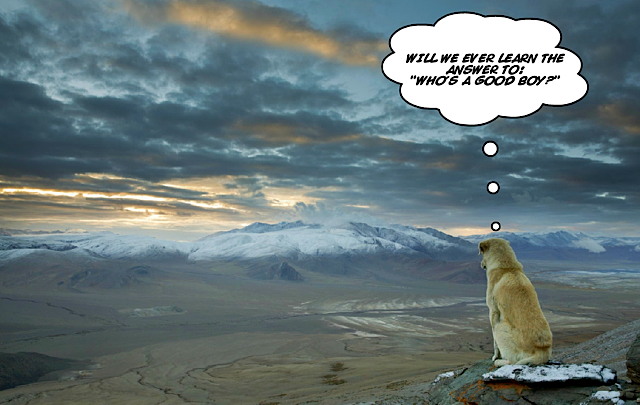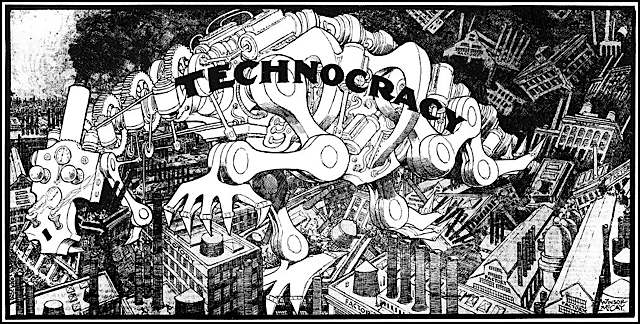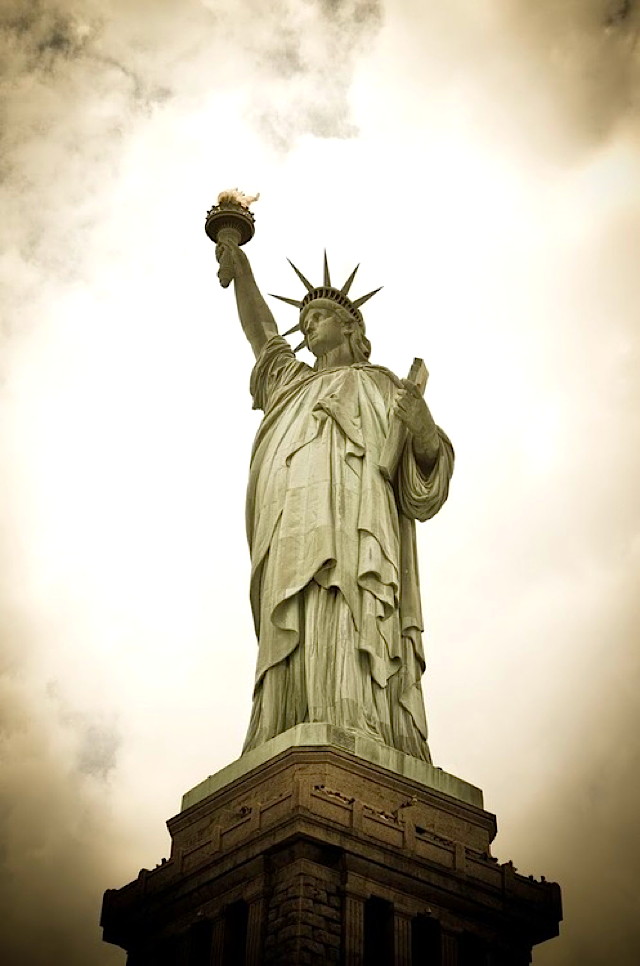 Written in 1548 and translated by Harry Kurz, 1942.
Written in 1548 and translated by Harry Kurz, 1942.
I should like merely to understand how it happens that so many men, so many villages, so many cities, so many nations, sometimes suffer under a single tyrant who has no other power than the power they give him; who is able to harm them only to the extent to which they have the willingness to bear with him; who could do them absolutely no injury unless they preferred to put up with him rather than contradict him. Surely a striking situation! Yet it is so common that one must grieve the more and wonder the less at the spectacle of a million men serving in wretchedness, their necks under the yoke, not constrained by a greater multitude than they, but simply, it would seem, delighted and charmed by the name of one man alone whose power they need not fear, for he is evidently the one person whose qualities they cannot admire because of his inhumanity and brutality toward them.
A weakness characteristic of human kind is that we often have to obey force; we have to make concessions; we ourselves cannot always be the stronger. Therefore, when a nation is constrained by the fortune of war to serve a single clique, as happened when the city of Athens served the thirty Tyrants,[4] one should not be amazed that the nation obeys, but simply be grieved by the situation; or rather, instead of being amazed or saddened, consider patiently the evil and look forward hopefully toward a happier future….
But O good Lord! What strange phenomenon is this? What name shall we give to it? What is the nature of this misfortune? What vice is it, or, rather, what degradation? To see an endless multitude of people not merely obeying, but driven to servility? Not ruled, but tyrannized over?
These wretches have no wealth, no kin, nor wife nor children, not even life itself that they can call their own. They suffer plundering, wantonness, cruelty, not from an army, not from a barbarian horde, on account of whom they must shed their blood and sacrifice their lives, but from a single man; not from a Hercules nor from a Samson, but from a single little man. Too frequently this same little man is the most cowardly and effeminate in the nation, a stranger to the powder of battle and hesitant on the sands of the tournament; not only without energy to direct men by force, but with hardly enough virility to bed with a common woman!
Shall we call subjection to such a leader cowardice? Shall we say that those who serve him are cowardly and faint-hearted? If two, if three, if four, do not defend themselves from the one, we might call that circumstance surprising but nevertheless conceivable. In such a case one might be justified in suspecting a lack of courage. But if a hundred, if a thousand endure the caprice of a single man, should we not rather say that they lack not the courage but the desire to rise against him, and that such an attitude indicates indifference rather than cowardice? When not a hundred, not a thousand men, but a hundred provinces, a thousand cities, a million men, refuse to assail a single man from whom the kindest treatment received is the infliction of serfdom and slavery, what shall we call that? Is it cowardice? Of course there is in every vice inevitably some limit beyond which one cannot go. Two, possibly ten, may fear one; but when a thousand, a million men, a thousand cities, fail to protect themselves against the domination of one man, this cannot be called cowardly, for cowardice does not sink to such a depth, any more than valor can be termed the effort of one individual to scale a fortress, to attack an army, or to conquer a kingdom. What monstrous vice, then, is this which does not even deserve to be called cowardice, a vice for which no term can be found vile enough, which nature herself disavows and our tongues refuse to name?
It amazes us to hear accounts of the valor that liberty arouses in the hearts of those who defend it; but who could believe reports of what goes on every day among the inhabitants of some countries, who could really believe that one man alone may mistreat a hundred thousand and deprive them of their liberty? Who would credit such a report if he merely heard it, without being present to witness the event? And if this condition occurred only in distant lands and were reported to us, which one among us would not assume the tale to be imagined or invented, and not really true? Obviously there is no need of fighting to overcome this single tyrant, for he is automatically defeated if the country refuses consent to its own enslavement: it is not necessary to deprive him of anything, but simply to give him nothing; there is no need that the country make an effort to do anything for itself provided it does nothing against itself. It is therefore the inhabitants themselves who permit, or, rather, bring about, their own subjection, since by ceasing to submit they would put an end to their servitude. A people enslaves itself, cuts its own throat, when, having a choice between being vassals and being free men, it deserts its liberties and takes on the yoke, gives consent to its own misery, or, rather, apparently welcomes it. If it cost the people anything to recover its freedom, I should not urge action to this end, although there is nothing a human should hold more dear than the restoration of his own natural right, to change himself from a beast of burden back to a man, so to speak. I do not demand of him so much boldness; let him prefer the doubtful security of living wretchedly to the uncertain hope of living as he pleases. What then? If in order to have liberty nothing more is needed than to long for it, if only a simple act of the will is necessary, is there any nation in the world that considers a single wish too high a price to pay in order to recover rights which it ought to be ready to redeem at the cost of its blood, rights such that their loss must bring all men of honor to the point of feeling life to be unendurable and death itself a deliverance?
Everyone knows that the fire from a little spark will increase and blaze ever higher as long as it finds wood to burn; yet without being quenched by water, but merely by finding no more fuel to feed on, it consumes itself, dies down, and is no longer a flame. Similarly, the more tyrants pillage, the more they crave, the more they ruin and destroy; the more one yields to them, and obeys them, by that much do they become mightier and more formidable, the readier to annihilate and destroy. But if not one thing is yielded to them, if, without any violence they are simply not obeyed, they become naked and undone and as nothing, just as, when the root receives no nourishment, the branch withers and dies.
To achieve the good that they desire, the bold do not fear danger; the intelligent do not refuse to undergo suffering. It is the stupid and cowardly who are neither able to endure hardship nor to vindicate their rights; they stop at merely longing for them, and lose through timidity the valor roused by the effort to claim their rights, although the desire to enjoy them still remains as part of their nature. A longing common to both the wise and the foolish, to brave men and to cowards, is this longing for all those things which, when acquired, would make them happy and contented. Yet one element appears to be lacking. I do not know how it happens that nature fails to place within the hearts of men a burning desire for liberty, a blessing so great and so desirable that when it is lost all evils follow thereafter, and even the blessings that remain lose taste and savor because of their corruption by servitude. Liberty is the only joy upon which men do not seem to insist; for surely if they really wanted it they would receive it. Apparently they refuse this wonderful privilege because it is so easily acquired.
Poor, wretched, and stupid peoples, nations determined on your own misfortune and blind to your own good! You let yourselves be deprived before your own eyes of the best part of your revenues; your fields are plundered, your homes robbed, your family heirlooms taken away. You live in such a way that you cannot claim a single thing as your own; and it would seem that you consider yourselves lucky to be loaned your property, your families, and your very lives. All this havoc, this misfortune, this ruin, descends upon you not from alien foes, but from the one enemy whom you yourselves render as powerful as he is, for whom you go bravely to war, for whose greatness you do not refuse to offer your own bodies unto death. He who thus domineers over you has only two eyes, only two hands, only one body, no more than is possessed by the least man among the infinite numbers dwelling in your cities; he has indeed nothing more than the power that you confer upon him to destroy you. Where has he acquired enough eyes to spy upon you, if you do not provide them yourselves? How can he have so many arms to beat you with, if he does not borrow them from you? The feet that trample down your cities, where does he get them if they are not your own? How does he have any power over you except through you? How would he dare assail you if he had no cooperation from you? What could he do to you if you yourselves did not connive with the thief who plunders you, if you were not accomplices of the murderer who kills you, if you were not traitors to yourselves? You sow your crops in order that he may ravage them, you install and furnish your homes to give him goods to pillage; you rear your daughters that he may gratify his lust; you bring up your children in order that he may confer upon them the greatest privilege he knows — to be led into his battles, to be delivered to butchery, to be made the servants of his greed and the instruments of his vengeance; you yield your bodies unto hard labor in order that he may indulge in his delights and wallow in his filthy pleasures; you weaken yourselves in order to make him the stronger and the mightier to hold you in check. From all these indignities, such as the very beasts of the field would not endure, you can deliver yourselves if you try, not by taking action, but merely by willing to be free. Resolve to serve no more, and you are at once freed. I do not ask that you place hands upon the tyrant to topple him over, but simply that you support him no longer; then you will behold him, like a great Colossus whose pedestal has been pulled away, fall of his own weight and break in pieces….
It is incredible how as soon as a people becomes subject, it promptly falls into such complete forgetfulness of its freedom that it can hardly be roused to the point of regaining it, obeying so easily and so willingly that one is led to say, on beholding such a situation, that this people has not so much lost its liberty as won its enslavement. It is true that in the beginning men submit under constraint and by force; but those who come after them obey without regret and perform willingly what their predecessors had done because they had to. This is why men born under the yoke and then nourished and reared in slavery are content, without further effort, to live in their native circumstance, unaware of any other state or right, and considering as quite natural the condition into which they were born. There is, however, no heir so spendthrift or indifferent that he does not sometimes scan the account books of his father in order to see if he is enjoying all the privileges of his legacy or whether, perchance, his rights and those of his predecessor have not been encroached upon. Nevertheless it is clear enough that the powerful influence of custom is in no respect more compelling than in this, namely, habituation to subjection. It is said that Mithridates trained himself to drink poison. Like him we learn to swallow, and not to find bitter, the venom of servitude. It cannot be denied that nature is influential in shaping us to her will and making us reveal our rich or meager endowment; yet it must be admitted that she has less power over us than custom, for the reason that native endowment, no matter how good, is dissipated unless encouraged, whereas environment always shapes us in its own way, whatever that may be, in spite of nature’s gifts. The good seed that nature plants in us is so slight and so slippery that it cannot withstand the least harm from wrong nourishment; it flourishes less easily, becomes spoiled, withers, and comes to nothing. Fruit trees retain their own particular quality if permitted to grow undisturbed, but lose it promptly and bear strange fruit not their own when ingrafted. Every herb has its peculiar characteristics, its virtues and properties; yet frost, weather, soil, or the gardener’s hand increase or diminish its strength; the plant seen in one spot cannot be recognized in another.
RTWT AT Discourse on Voluntary Servitude – Wikisource, the free online library


![That Was the Whopper Weekend That Was [Illustrated] welcometohell](https://americandigest.org/wp/wp-content/uploads/2021/05/welcometohell-150x150.jpg)

![Allen Ginsberg: The Interview, <strong> ➡ 1972 ⬅ </strong> [Republished by unpopular demand] ginsbergnirvana](https://americandigest.org/wp/wp-content/uploads/2022/05/ginsbergnirvana-150x150.jpg)



 Gerard Van der Leun
Gerard Van der Leun
























Comments on this entry are closed.
Well, for starters our Founding Fathers understood history very well and thus;
“…all experience hath shewn, that mankind are more disposed to suffer, while evils are sufferable, than to right themselves by abolishing the forms to which they are accustomed. But when a long train of abuses and usurpations, pursuing invariably the same Object evinces a design to reduce them under absolute Despotism, it is their right, it is their duty, to throw off such Government…”
With respect to Monsieur La Boétie and his Discourse on Voluntary Servitude, I can only say that the French have a different view of how to expel tyrants….much different that the American method.
I would further expound that as the essay may relate to the current national debacle we are witnessing, there is much afoot in terms of resistance. I say again, keep an eye on Maricopa county, AZ. They are finding massive fraud, incompetence and corruption and that is just the tip of the iceberg. Wait till it goes back to GA and then WI and then, PA.
I am beginning to wonder if Mike Lindell is really on to something when he asserts that Trump will be back in the WH by August. Am I delusional?
That was a long essay but it was worth the read. I wish Americans would Wake TF Up, gather en masse and move on Washington as well as their local corrupt and f’ing wicked officials, like that triplecunt from Michigan who thinks she’s Daenerys Targaryen.
Very nice catch. Thanks for that.
I first came across Étienne de La Boétie in the context of his close friendship with Michel de Montaigne– who wrote a famous essay on friendship to commemorate de La Boétie, who was only 32 years old when he died in 1563. Montaigne says in this essay that it was the Discourse on Voluntary Servitude that drew him to de La Boétie. “And this particular obligation I have to this treatise of his, that it was the occasion of my first coming acquainted with him; for it was showed to me long before I had the good fortune to know him; and the first knowledge of his name, proving the first cause and foundation of a friendship, which we afterwards improved and maintained, so long as God was pleased to continue us together . . .” According to Montaigne, de La Boétie was only eighteen when he wrote the treatise; he graduated from the law school of the University of Orléans at the age of 22 and served as a judge until his untimely death. Montaigne wondered (and I think we can agree with him) what his friend might have contributed to political theory had he lived longer.
Jack sed: “I wish Americans would Wake TF Up”
========
I don’t think they can Jack. Or rather, they are incapable, or flat out lazy, and will not act until the flame is licking at their feet.
I have talked to people like that and it is an amazing thing. It’s like they cannot think farther than directly in front of their face. They won’t think 2, 3, 4 or more steps ahead. Capable only of immediate linear thinking, rather than 2nd order thinking. When pushed, they squeal, “Who will build the roads?”, or, “Who will protect the country?”, never mind that they have no real concept of country other than exposure to the hollow platitudes since childhood.
It is truly breathtaking the depth of ignorance, naivete, and gullibility combined with cowardice and frivolousness that abounds in the average american human being. I call this “deadweight” with very little benefit other than basal draft animals easily herded and corralled. Sad but true.
[5star]